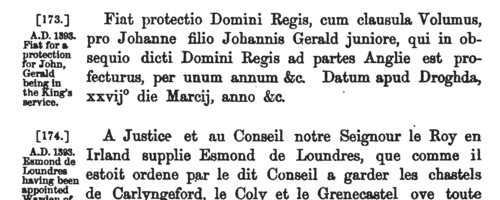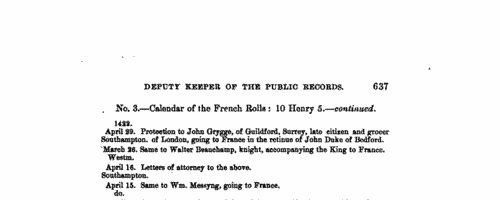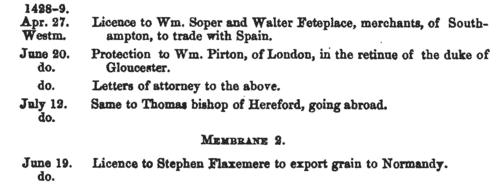Wyot Surname Ancestry ResultsOur indexes 1000-1999 include entries for the spelling 'wyot'. In the period you have requested, we have the following 46 records (displaying 21 to 30): Single Surname Subscription | | | Buying all 46 results of this search individually would cost £230.00. But you can have free access to all 46 records for a year, to view, to save and print, for £100. Save £130.00. More... |
These sample scans are from the original record. You will get scans of the full pages or articles where the surname you searched for has been found. Your web browser may prevent the sample windows from opening; in this case please change your browser settings to allow pop-up windows from this site. Inhabitants of Yorkshire: Tickhill wapentake
(1379)
The poll tax returns for this wapentake, the area around Tickhill.WYOT. Cost: £6.00.  | Sample scan, click to enlarge

| Essex Poll Tax: Stebbing
(1381)
Charles Oman transcribed and edited the poll tax returns for Hinckford (Public Record Office Lay Subsidy Essex 107/68) for his study of the peasants' rising of 1381. Full lists of adults are given, township by township, grouped by status or occupation. There are returns for Alhamston & Buris (Alphamstone and Bures), Bewchamp Oton (Belchamp Otten), Bumstede ad T'rim (Steeple Bumpstead), Felstede (Felstead), Fynchyngfelde (Finchingfield), Gelham Parva (Little Yeldham), Gosfeld (Gosfield), Hythingham Sibill (Sible Hedingham), Ovyton (Ovington), Pentelowe (Pentlow), Salyng Magna (Great Saling), Stebbyng (Stebbing), and Sturmer.WYOT. Cost: £6.00.  | Sample scan, click to enlarge

| Devon and Cornwall clerks, clerics, monks and clergy
(1370-1382)
Ordinations to first tonsure, acolytes, subdeacons, deacons and priests, from the register of bishop Thomas de Brantyngham of Exeter. Exeter diocese covered the counties of Cornwall and Devon. Some of these clerks would go on to obtain benefices and remain celibate. The lists of subdeacons, deacons and priests state the clerks' respective titles, i. e., give the names of the person or religious house undertaking to support them. Monks and friars ('religious') are bracketed separately as such.WYOT. Cost: £6.00.  | Sample scan, click to enlarge

| Fine Rolls
(1377-1383)
The fine rolls of the 1st to 6th years of the reign of king Richard II record part of the government administration in England, with orders sent out day by day to individual officers, and commitment of particular responsibilities and duties. There is also some material relating to Wales, Scotland, Ireland and the English possessions in France. WYOT. Cost: £4.00.  | Sample scan, click to enlarge

| English administration in Ireland
(1392-1393)
This roll of proceedings of the King's Council in Ireland from June 1392 to April 1393, in the 16th year of the reign of Richard II, survived among the archives of the Marquis of Ormode; it was transcribed by the Reverend James Graves, and published in 1877 as a volume in the Chronicles and Memorials series. Part of the record is in Latin, part in French, and Graves provided translations into English for all the French text. The record is mainly of commissions, letters of protection, and fiats for registration on the Patent Roll. Some related documents from the British Museum and the Public Record Office are transcribed in the appendix, including an inspeximus of 1444 with the names of burgesses of Drogheda.
WYOT. Cost: £4.00.  | Sample scan, click to enlarge

| Inhabitants of Cheshire and North Wales
(1390-1399)
The county of Cheshire had palatine status, being in some measure independent of the rest of England: moreover, from the Statute of Wales of 1284, after king Edward I's subjugation of North Wales, until the union of England and Wales in 1536 to 1543, much of the administration of North Wales (county Flint in particular) was directed from Chester. When the Chester Recognizance Rolls were moved from Chester to the Public Record Office, they were placed among the Welsh Records. These rolls, so called because they do include recognizances (of debts &c.) among their contents, are in fact the Chancery Rolls of the palatinate, containing enrolments of charters, letters patent, commissions and other documents issued under the seal of the palatinate. Deeds and other evidences of a private nature were also enrolled on them. A calendar of the Recognizance Rolls from their commencement to the end of the reign of Henry IV was prepared by Peter Turner and included in the 36th Annual Report of the Deputy Keeper of the Public Records in 1875. We have now indexed this, dividing the enrolments into decades. This is the period from the 13th year of king Richard II, who had intended to raise the earldom of Chester into a principality, to his overthrow by Henry IV.WYOT. Cost: £6.00.  | Sample scan, click to enlarge

| Clergy, the religious and the faithful in Britain and Ireland
(1362-1404)
These are abstracts of the entries relating to Great Britain and Ireland from the Regesta of popes Urban V, Gregory XI, (Anti-Pope) Clement VII, Urban VI and Boniface IX, and the Lateran Regesta of Boniface IX. Many of these entries relate to clerical appointments and disputes, but there are also indults to devout laymen and women for portable altars, remission of sins, &c. This source is particularly valuable for Ireland, for which many of the key government records of this period are lost. Urban V was consecrated and crowned 6 November 1362 (the day from which his pontificate is dated); Gregory XI was crowned 5 January 1371; Clement VII 31 October 1378; Urban VI 18 April 1378; Boniface IX 9 November 1389 and died 1 October 1404. Until 1376 the papacy was in exile at Avignon. The extracts were made by W. H. Bliss from Regesta ccxlv to cccxx and Lateran Regesta i to xliii, and published in 1902. Bliss remarked that 'although the writing of the Papal Registers of the 14th century is clearer than that of many contemporary English MSS., the entries in them were for the most part founded upon petitions or letters from different countries, and the scribes in the Papal Chancery must have experienced even greater difficulty in copying English proper names than English students experience nowadays in reading the early Chancery Rolls preserved in the Public Record Office. Not having local or personal knowledge, they constantly misread doubtful letters.'WYOT. Cost: £4.00.  | Sample scan, click to enlarge

| The English in France
(1421-1422)
King Henry V of England claimed the throne of France (and quartered the fleurs-de-lis of France with the lions of England on the royal standard) as had his predecessors since Edward III, as descendants of Philip IV of France. He married Katherine, youngest daughter of king Charles VI of France in 1420, and thereafter styled himself 'heir and regent of France'. The English had real power or influence in Brittany, Normandy, Flanders and Gascony, and actual possession of several coastal garrisons, in particular Calais, where the French inhabitants had been replaced by English. The English administration kept a series of records called the French Rolls. On these are recorded royal appointments and commissions in France; letters of protection and safe-conduct to soldiers, merchants, diplomats and pilgrims travelling to France from England and returning, and to foreign legations. There are also licences to merchants to export to the Continent, and to captains to transport pilgrims. This calendar of the French Roll for the 9th year of the reign of Henry V (21 March 1421 to 20 March 1422) was prepared by Alexander Charles Ewald and published in 1883. WYOT. Cost: £6.00.  | Sample scan, click to enlarge

| London Drapers' Accounts
(1425-1426)
The accounts of the Worshipful Company of the Drapers of London for August 1425 to August 1426 include fees for apprentices, payments from masters, tenants and workers.WYOT. Cost: £6.00.  | Sample scan, click to enlarge

| The English in France
(1427)
King Henry VI of England (one of the grandsons of Charles VI of France) claimed the throne of France (and quartered the fleurs-de-lis of France with the lions of England on the royal standard) as had his predecessors since Edward III, as descendants of Philip IV of France. The English had real power or influence in Brittany, Normandy, Flanders and Gascony, and actual possession of several coastal garrisons, in particular Calais, where the French inhabitants had been replaced by English. Henry VI came to the throne only seven years after his father had trounced the French at Agincourt; but his cousin, Charles VII, who became king of France in the same year, spent his long reign rebutting the English king's claim to his throne by territorial reconquest and consolidation. The English administration kept a series of records called the French Rolls. On these are recorded royal appointments and commissions in France; letters of protection and safe-conduct to soldiers, merchants, diplomats and pilgrims travelling to France from England and returning, and to foreign legations. There are also licences to merchants to export to the Continent, and to captains to transport pilgrims. As Henry VI's reign progressed, and the English grip on northern France loosened, the French Rolls also increasingly include entries concerning the ransoming of English prisoners.WYOT. Cost: £6.00.  | Sample scan, click to enlarge

|
Research your ancestry, family history, genealogy and one-name study by direct access to original records and archives indexed by surname.
|












